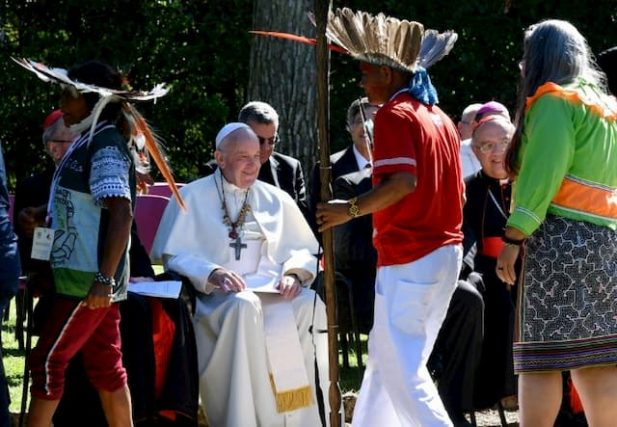Fire in the Amazon: Pope Francis Denounces “Destructive Interests”

The fires that ravaged the Amazon this summer are at the heart of the synod that opened in the Vatican Sunday 6th October 2019 bringing together 113 bishops from the Panamazonian zone.
The Pope Francis denounced Sunday 6th October 2019 “the greed of new colonialism” and lamented the fires lit “by interests that destroy,” by opening a synod dedicated to the Amazon.
The synod gathered for three weeks in the Vatican some 184 bishops, including 113 from the Panamazonian region, straddling nine countries, especially Brazil.
This country is home to 60% of the largest tropical forest on the planet, devastated this summer by fires mostly voluntary to make room for cattle breeding and crops. The fires sparked international outcry and exacerbated relations with President Jair Bolsonaro, who accuses some countries of “colonial” stance.
Representatives of indigenous peoples and ethnic groups, dressed in colourful feathered headdresses, on Sunday discovered St. Peter’s Basilica for the inaugural Mass of the Synod, whose debates begin Monday.

” Help us ! “
“Help us defend our mother earth, we have no other home! Implored the indigenous missionary sister Laura Vicuña, a few hours before the opening of the synod, attended by about twenty representatives of indigenous communities.
This missionary who struggles at the risk of her life for the defence of the Caripuna territories in the Brazilian Amazon came symbolically to Rome with the land. “Earth, water, forest, without these three elements nobody can do anything,” she explained.
The frail young woman travelled 150 kilometres through the Caripuna region to document and denounce the amputation of their land. “The satellite images show a road that goes straight to native lands,” she says, before bursting into tears as she explains the terror of the “death threats from organized crime” that often forces her to hide.
“We are asking the world for help because we are very worried about the new mining exploration policy in the Amazon,” José Luiz Cassupá, a native of Rondônia in Brazil, told AFP. came to Rome with his headdress of indigo blue feathers.
Denouncing “the destruction of indigenous lands,” he complains of a Brazilian government “that did not keep his word.” “After painfully getting a tiny piece of land to survive, the natives do not end up being hunted,” he laments.

“New colonialism”
On Sunday, the Argentine pope offered them his support as an international moral figure in condemning fires “lit by destructive interests, like the one that recently devastated the Amazon”. This type of “devastating” fire aims, in particular, to “burn the diversities to standardize all and everything,” he said in a homily.
Regretting that the Church has often participated in the past in “colonization” through an “imposed” evangelization, he warned against “the greed of new colonialism” in the presence.
The working document of the synod, fruit in particular of a vast local consultation in the Amazon, denounces the social injustices even the assassinations of the region while tracing the future action of the Catholic Church which loses ground due to a shortage of priests.
The move supports Brazilian climate-conservative President Jair Bolsonaro, who told a local media in August that Brazilian intelligence services would monitor the synod.
In this hostile context, the Brazilian Cardinal Claudio Hummes, president of the Pan-Amazon Ecclesial Network (REPAM) and rapporteur of the synod, reiterated that the Church respected “the national sovereignty” of Brazil.
Capitalist Indigenous
On the sidelines of the synod, Jonas Marcolino, from the Brazilian Macuxi ethnic group, chose the opposite camp. “I regret that the synod did not invite any native who thinks differently of the missionaries,” he told AFP on Saturday while attending a conference of an ultra-conservative Brazilian Catholic institute.
The man from the region of Roraima defends without complex “capitalism and progress”. “What the Church is asking in our region is hating whites, preventing the opening of roads and the arrival of electricity,” Jonas Marcolino asserts, criticizing a theological current that supports “Marxism”.
If socio-economic and environmental issues will have a large place at the synod, bishops will also discuss innovative but controversial proposals such as the possibility of ordaining priests of preferably Aboriginal married-age men and finding types of ministries for women.
Explosive questions that will remain in the opinion of the Pope, who will write his own text after the Synod. Francis called on bishops on Sunday to be open to change, so that the synod “renew the paths of the Church in the Amazon”.

Enjoyed this? Get the week’s top France stories
One email every Sunday. Unsubscribe anytime.


